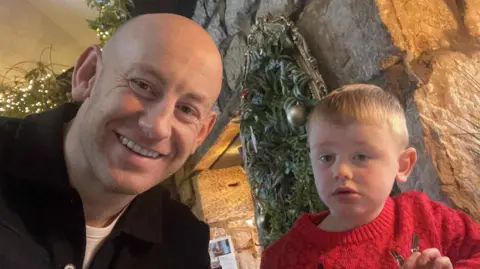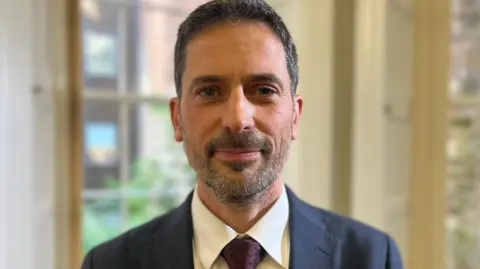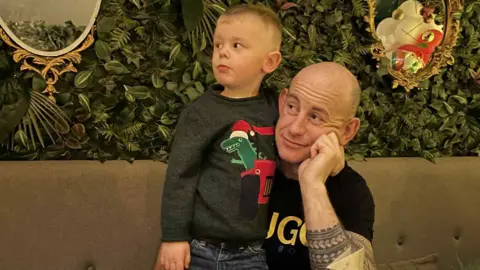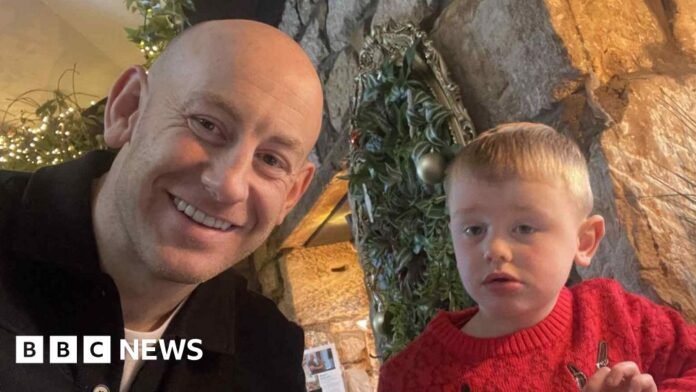Education Correspondent
BBC Scotland News
 Family photo
Family photoFive-year-old Callum is autistic and non-verbal.
At nursery, he received weekly one-to-one speech and language therapy to try to develop his speech.
His family says he was making good progress and when he started primary school last summer they were led to believe the support would continue.
Instead, it stopped, and they are now scared he may never speak.
Callum is one of thousands of children struggling to access the right support with speech.
Demand is increasing
A new report seen by BBC Scotland News shows that demand for speech and language therapists (SLT) is increasing in Scotland but that the numbers of therapists is falling behind the rest of the UK.
It says more than half of the children who need specialist support are waiting more than 18 weeks and some are waiting up to three years.
The report, by the Royal College of Speech and Language Therapists (RCSLT), says Scotland needs to increase its full-time equivalent SLT therapists by 370, from a current total of 530.
It also says that Scotland is lagging behind England in terms of the ratio of speech and language therapists to children.
The RCSLT report states: “Over the past five years, Scotland’s speech and language therapy workforce increased by just 2%, compared to 15% across the rest of the UK.
“This limited growth has not kept pace with rising demand.”
Freedom of Information (FOI) data, obtained by the RCSLT, shows that the number of children waiting for speech and language therapy increased from 6,503 in May 2023 to 6,727 in May 2024 – with 53% waiting longer than 18 weeks in both years.
In some health boards, children are waiting for as long as two to three years for an initial contact, it said.
The Scottish government has promised to publish an Early Years Speech and Language action plan by the autumn.

Glenn Carter, the head of the RCSLT in Scotland, said the report highlighted the importance of embedding SLT in nurseries and supporting children before they get to school as well as once they are there.
He said the provision of SLT was “variable”, with excellent examples in some areas but low levels of funding in others.
Mr Carter said this led to those most in need not getting the resources they require.
“There are kids experiencing significant challenges in school and that causes behavioural issues, which in turn causes stress for teachers,” he said.
“We feel that by positioning speech and language therapists within education we can solve quite a lot of the problems that Scotland is facing right now.”
One-to-one support
Teachers say that since Covid more and more children are starting primary school without being able to communicate verbally.
Recent figures from Public Health Scotland show that last year more than one in 12 children recorded a delay in speech and language by age five.
Pre-pandemic (2018/19) the figure was only one in 20.

Speech and language therapy in schools is delivered by the NHS but partly funded by councils.
Callum goes to a specialist “communication needs” school called Redburn in Cumbernauld, North Lanarkshire.
His father Grant said the school and staff are excellent but there is no SLT provision.
He thought his son was still getting one-to-one support but then found out the therapist had been off sick.
“It was really upsetting,” Grant told BBC Scotland News.
“To try to put yourself in his shoes and say how would you feel trying to survive in the world without being able to communicate?” he said.
“He’s due that, he’s got a human right to be able to have it, to give him the tools he needs to be able to survive in this world.”
Last week other parents at the school received a letter from NHS Lanarkshire to “apologise” for the fact they had not received SLT support.
Grant spoke to a teacher last month who confirmed that Callum had never been referred for speech and language therapy since he arrived at primary school.
They promised to refer him but he believes that referral hasn’t been processed as he didn’t receive the NHS letter.
The council have pledged to offer more support in August, but Grant thinks it will be “nowhere near enough”, based on the level of demand at Redburn school.

Being non-verbal means Callum can get very distressed if he does not understand what is going on but also cannot tell people what he needs.
His father Grant has been told that this is a crucial stage for his son to get specialist support.
Early intervention for children with mutism is recognised as crucial to prevent the problem continuing into adulthood.
Grant said: “I’m worried he won’t be able to speak.
“There’s evidence that says the key age is 4-8, where if they can get assistance, then there’s evidence of positive outcomes,” he said.
“They are failing in their duty of care if that doesn’t happen.”
The Scottish government said it had invested in a programme to support early intervention in speech and language, helping to build confidence and capacity of staff working in early learning and childcare.
A spokesman said: “As laid out in the Programme for Government, we will publish an Early Years Speech and Language action plan by autumn 2025, which will set our practical steps to support children’s early speech and language development.”
A North Lanarkshire Council spokeswoman said: “There are UK-wide challenges in recruitment of speech and language staff, and we continue to work closely with colleagues at NHS Lanarkshire to assist in mitigating these.”
Pauline Downie, from NHS Lanarkshire, apologised for any distress its letter had caused.
She said: “The intention of the letter is to give parents an opportunity to contact us to discuss any concerns they have regarding the speech, language and communication support for their child.”







